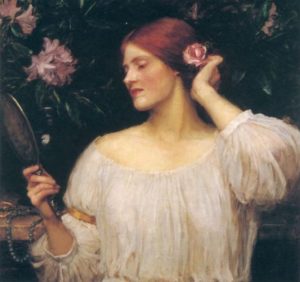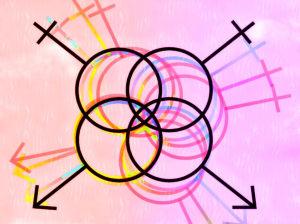By Alice Elbakian

The above painting by John William Waterhouse is titled Vanity (1910) and, I am sure, has been the subject of many angry feminist rants. Waterhouse must have thought her intriguing or beautiful or enchanting, at least enough to want to paint and capture her. He paints her with a mirror in hand, she is dressed in white, wearing makeup, and is fixing her hair with a flower (an obvious symbol of femininity). She’s near jewelry and more background flowers, femininity all around. He seems to laud her as she lauds her femininity. None of this is problematic. Until he titles it. Vanity. He doesn’t mean furniture. It’s not a compliment. It’s the perfect example of Marilyn Frye’s double bind, and it is the earlier, Victorian version of slut shaming or duck-face-selfie shaming (I can only assume).
The subject in the painting appears to do everything she is “supposed to do” in Victorian society. She walks the walk and silences her talk. She is shrouded in femininity. She is femininity. She occupies space in a man’s world, abiding, of course, by man’s rules. She wears a sign that says “I’m not a threat”. Waterhouse presumably saw a perfect woman and wanted to paint her. But he doesn’t reward her or her perfect womanity, the very things that drew him to her. Instead he immortalizes a shameful conception of this woman. He labels his subject ‘vain’ even though if she were not doing what she is doing in the painting, he would hardly have found her muse-worthy, in fact he likely would have looked down on her. Social standards tell the subject to do one thing. She’s rewarded for this in the only way she can be – she’s objectified –but even this doesn’t happen positively.
She’s given a new name. Vain. Excessively proud. Or, worthless and futile. Depending on the definition. She does what she’s told. She’s good – maybe too good. A woman getting too comfortable with
herself, growing too comfortably in the skin she’s been prescribed to wear. Maybe she’s beginning to see herself, as beautiful, in that little mirror? Like a Victorian selfie. She already seems to be celebrating herself, maybe she wants to document the moment on her own, form her own conception of self, with her own eyes. With eyes that might see her the way she wants to be seen. With eyes that might know her full story. Like a selfie.
No. The moment she does this is the moment that Waterhouse captures and criticizes. In the title he returns to his role of oppressor and “looker”. Decider. He reminds the subject and every viewer that it’s offensive and devaluing for women to love themselves, to see themselves, to honor the parts of themselves that are at once most natural and contrived. Because the point isn’t just following the rules. It’s occupying the space you’re allotted in the way you’re supposed to.
Click for more about the “revolutionary potential of your own face” in relation to the selfie.




